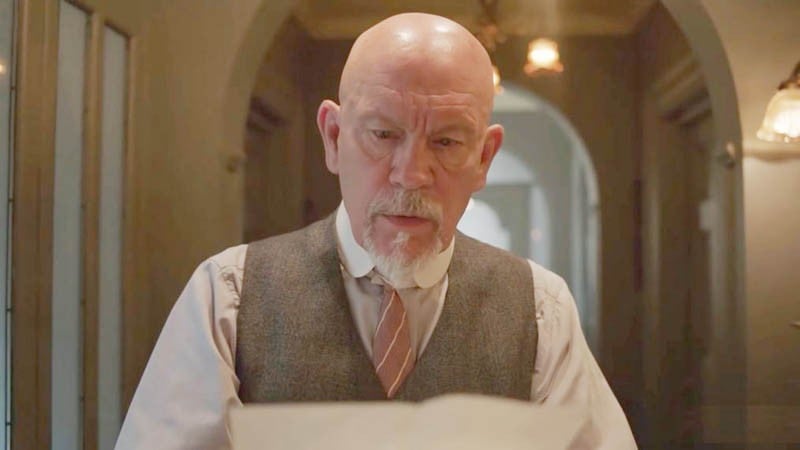
Xenophobia is emphasised in a TV dramatisation of Agatha Christie

Dear All,
Television viewing over the Christmas and new year holidays in Britain always seems to consist of several stock films (Home Alone, Mary Poppins, Dr Zhivago etc. etc.) along with period dramas and re-runs of Agatha Christie mysteries, mostly featuring her eccentric detective Hercule Poirot. This time round though, the BBC telecast a new Poirot, in 3 episodes and with American actor John Malkovich as Poirot.
Malkovitch as Poirot is an interesting move: an American, who always seems to play John Malkovitch whatever the role, plays Christie’s vain, ‘egg shaped’ Belgian detective. But what is also interesting is what the producers have done with the story, set in 1933, and how they have used the time period to resonate with pre-Brexit Britain (the divorce from Europe just a few weeks away).
What we are shown is a country where fascism is on the rise, the police are racist and distrustful of ‘foreigners’ and where anti-immigrant sentiment is being stoked all around. These analogies to pre-Brexit Britain and the xenophobic tone of the Leave campaign are thrown into this Christie adaptation as a sort of swan song to Britain’s European phase, but they seem to have irritated viewers who mostly dislike any tampering with Christie plots.
Agatha Christie (like Enid Blyton and Daphne du Maurier) is one of several prolific British women writers of the 20th century. She wrote 66 detective novels and 14 short story collections and created the rather unusual sleuths Hercule Poirot and the geriatric Miss Marple. Her story Three Blind Mice was adapted for the stage as The Mousetrap which has become the longest running production in London’s West End -- and indeed the world (from 1952 to date). Christie is regarded as the Queen of Detective Fiction, the whodunnit author par excellence and the creator of the British country house murder mystery.
Because of this, her readers and fans dislike changes to her plots and characters which, for some reason, is a growing trend. This ABC Murders production is guilty of several such changes: Poirot’s backstory is revealed to be a lie, he is not the Belgian policeman who became a refugee in Britain but a much more tortured and ‘reborn’ character. Moreover, Inspector Japp is done away with in this production and many of the characters’ sexual histories are made slightly more interesting. But, however much depth (or not) this might add, a basic question remains -- how much license should writers and producers have in altering or developing the writer’s plots and characters?
A ‘Poirot’ novel commissioned a few years ago (The Monogram Murders), was a sad Christie imitation and also raised the question of why we even needed an Agatha Christie whodunnit not actually written by Agatha Christie.
Christie’s Poirot is a rather OCD-driven character (the descriptions of how exactly he must eat his egg at breakfast are memorable), who follows certain precise routines and is very particular about how he dresses and waxes his moustache. He is Belgian and so is constantly irritated by being presumed French, and he is certainly no fan of British cuisine.
But the new BBC production adds several elements to Poirot in its desperation to evoke the Brexit context. Apart from the racism and the fascist posters encouraging people to help ‘stem the tide’ of immigrants, we learn that Poirot himself has been receiving hate mail regularly for years, purely because he is ‘a foreigner’. Malkovitch portrays the aging, frailer Poirot in an interesting way but mostly he’s just being John Malkovitch. Of course, being Poirot is no easy task: it’s about as controversial as the casting of James Bond and David Suchet’s Poirot is a horribly hard act to follow (Albert Finney, Peter Ustinov and Kenneth Branagh have all played the role, but for many Christie fans, Suchet still reigns supreme).
Agatha Christie’s stories still interest readers because of what they tell us of social ranking, human relationships and dysfunctional families and because of the admiration we feel for a detective who is able to see things so clearly and explain everything to us in the great reveal of the plot. Getting back to reading Christie after many years is one of the pleasures that will feature on my list of new year resolutions. And watching TV adaptations of Christie, however controversial they may be, also remains on the list of general home entertainment…
Best wishes for a very good year: may 2019 bring us peace and happiness. May reason prevail, and may those loud shouty men on Pakistan’s ‘political discussion’ shows shut up and calm down and perhaps even start being as polite as Poirot …